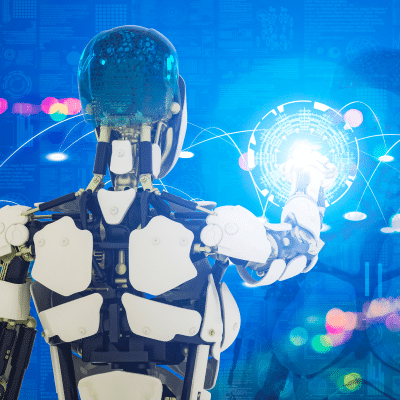|
Getting your Trinity Audio player ready...
|

Artificial Intelligence (AI) holds transformative potential in enhancing the quality of life for individuals with disabilities. AI for the disabled, from assistive technologies that enable hands-free control of devices to smart prosthetics that adapt to user movements, AI innovations are revolutionizing accessibility and independence.
AI for the disabled holds immense potential to improve the lives of individuals with disabilities by providing innovative solutions across various domains.
Here are some AI solutions tailored for the disabled community:
- Assistive Technologies: AI-powered assistive technologies can help individuals with disabilities perform everyday tasks more independently. For example, voice recognition systems can assist those with mobility impairments. This allows them to control electronic devices and appliances using voice commands.
- Smart Prosthetics: AI algorithms can enhance the functionality of prosthetic limbs by enabling them to adapt to the user’s movements and intentions more intuitively. Advanced sensors and machine learning algorithms can analyze data in real-time to optimize prosthetic control and provide a more natural user experience.
- Augmented Communication: AI-powered communication tools, such as predictive text and speech synthesis, can assist individuals with speech and language disabilities. This helps to express themselves more effectively. These technologies can predict words or phrases based on context and user input, making communication faster and more efficient.
- Computer Vision for Visual Impairments: Computer vision algorithms can analyze visual information and provide auditory or tactile feedback to individuals with visual impairments. For example, AI-powered apps can recognize objects, text, and faces in the environment. Then convey this information to users through audio descriptions or haptic feedback.
More AI solutions for the disabled community:
- Accessible Transportation: AI-based navigation and transportation systems can improve accessibility for individuals with disabilities. These systems can provide personalized route recommendations, identify accessible transportation options, and assist users in navigating public spaces more efficiently.
- Healthcare Monitoring and Assistance: AI-driven healthcare monitoring systems can help individuals with disabilities manage their health more effectively. These systems can analyze biometric data, detect abnormalities or emergencies, and provide timely alerts or assistance to users and caregivers.
- Education and Learning Support: AI technologies can enhance educational experiences for individuals with disabilities by providing personalized learning resources and adaptive learning environments. AI-powered tutoring systems can adapt instructional content to the individual’s learning style and pace, facilitating greater engagement and comprehension.
AI solutions have the potential to break down barriers and empower individuals with disabilities to lead more independent, fulfilling lives. By leveraging the capabilities of AI for the disabled, we can create more inclusive and accessible societies for everyone.
Learn more about TWINTEL or call us at (888) 428-0599 or schedule a meeting today.
Click Here To Claim Your FREE Assessment and Action Plan
Mark Johnson is a passionate technology professional with over 11 years of experience in the Managed Services IT space and a wide variety of industry-leading certifications. Mark’s extensive Managed IT experience and aptitude for quickly learning and adapting to new technologies has equipped him to offer valuable insight across a broad spectrum of business technology solutions.
